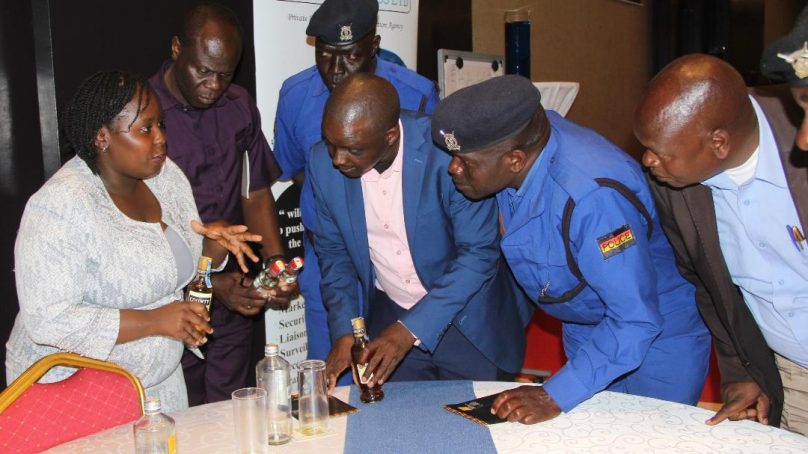
Alcoholic Beverages Association of Kenya (ABAK) convened a stakeholder engagement forum in Eldoret, Uasin Gishu County to address the growing menace of illicit alcohol trade in the North Rift region.
The meeting was to gather insights and fostering interagency collaboration to counteract the rise in counterfeit spirits and unlicensed artisanal alcohol. Participants were drawn from Elgeyo Marakwet, Nandi and Uasin Gishu Counties and included representatives from multiple government agencies.
Among those present were officials from the National Police Service (NPS), Kenya Bureau of Standards (KEBS), Kenya Revenue Authority (KRA), Anti-Counterfeit Authority (ACA) Office of the Director of Public Prosecutions (ODPP), Probation Services and Judiciary.
Speaking at the event, ABAK Chair Samuel Matano raised alarm over the issue of illicit and counterfeit alcohol in Kenya, terming it a serious public health and economic threat.
“Trade in counterfeit alcohol is growing at an alarming rate. This not only results in significant national revenue loss but poses a grave health risk particularly to our youth, who are the future of this country,” Matano explained.
He cited findings by Euromonitor International that show that illicit and counterfeit alcohol accounts for approximately 60 per cent of the market in Kenya.
“Counterfeiting remains a persistent challenge, causing a total tax loss of Ksh14.5 billion annually. We are here today to develop a collective strategy to combat these illegal activities and protect lives,” added Matano.
According to Euromonitor’s data, counterfeit and illicit alcohol products have surged since the Covid-19 pandemic, with the most rapid growth occurring in tax leakage and counterfeit spirits.
Since 2022, counterfeit and illicit brands have grown significantly, now representing 12 per cent of total illicit volumes in Hectoliters for Liquid Alcohol Equivalent (LAE). Popular spirit brands like Gilbeys Gin and Chrome Vodka have been the most affected.
The total tax loss from smuggled alcohol jumped from Ksh3.5 billion in 2022 to Ksh8.6 billion in 2024. Smuggled ethanol has seen a sharp increase, driven by high domestic prices and taxation. In addition, the prevalence of illicit artisanal brews surged in 2024 as economic pressures made legally produced alcohol unaffordable for many.
Local brews such as Chang’aa and Muratina, being significantly cheaper than legal alternatives, have fuelled the growth of this underground market. Illicit artisanal alcohol now holds a staggering 67 per cent share of the illegal market and accounts for the highest fiscal loss at Ksh80.7 billion.
Tax leakage, largely attributed to under-declaration or non-declaration of production by small and medium-sized distilleries, constitutes 16 per cent of illicit alcohol volumes. The associated tax loss rose by 44 per cent, reaching Ksh16.1 billion in 2024.
David Rithaa from East Africa Breweries Limited (EABL) expressed his concern over the growing availability of contraband alcohol in Kenya. He highlighted affordability and deceptive packaging as key factors luring consumers into buying dangerous counterfeit products.
“The uptake of these dangerous brews is shocking. I recently found Muratina being packaged professionally and sold in residential neighbourhoods. We must act to protect our people because this is poison. It will kill our citizens and our children,” Rithaa said.
Participants also flagged cross-border smuggling from neighbouring countries as a major hurdle. Illicit alcohol, particularly high-alcohol-content spirits, enters Kenya through loosely monitored or completely unguarded border points, especially in areas like Nyanza. Once in the country, these products are quickly distributed into informal urban markets and slums, making enforcement increasingly difficult.
Charles Kuria, ABAK’s Head of Operations – Protection Logic, provided enforcement officers with training on how to authenticate alcoholic products using KRA’s Soma Label App. He said the importance of verifying product legitimacy before taking legal action.
Market Surveillance Officer at KEBS Francis Mureithi advised urged consumers and enforcement officers to verify products via SMS by sending the code “SM#product code” to 20023, or by calling 1514, KEBS’ toll-free hotline, to report non-compliant products.
NACADA County Coordinator Calvin Olulo highlighted the evolving nature of illicit alcohol production and storage. He noted that constant shifts in manufacturing techniques and locations have made enforcement and interpretation of the law challenging.
“People are innovating new ways to produce and hide these brews. To make any real progress, we need a united front in tackling the Alcohol and Drug Abuse (ADA) menace,” Olulo stated.
From the legal front, Jackline Kiptoo from the ODPP in Nandi County addressed the importance of strong evidence in securing convictions for alcohol and drug-related offences.
“Going forward, the ODPP will not accept charge sheets lacking strong and clear evidence. Police officers must properly collect and maintain records of drug-related exhibits – from the time of seizure to presentation in court. Any break in this chain of custody can lead to case dismissal,” Kiptoo warned.
Deputy County Police Commander (DCPC) for Uasin Gishu County Patrick Wekesa, who represented the National Police Service, focused operational difficulties and noted that illicit alcohol operations have grown more complex and are often protected by influential individuals.
“Police and county officers work tirelessly, sometimes even using their own money to collect evidence and pursue court cases. But some illicit alcohol traders are backed by powerful people, including politicians, making enforcement risky,” Wekesa said.
He added that police have begun to rely on modern technology and intelligence tools to identify and disrupt illicit networks.
Deputy County Commissioner (DCC) for Ainabkoi Sub-County Henry, who spoke on behalf of County Commissioner Eddyson Nyale, stressed the need for multi-agency collaboration. He said such synergy is crucial to curbing illicit and counterfeit alcohol, which has led to both economic and human losses.
“We cannot win this war alone. We need each stakeholder to play their role, whether in enforcement, legal processing, or public awareness. The fight against illicit alcohol is a fight to save lives and national revenue,” Rop stated.
- A Tell Media / KNA report / By Ekuwam Sylvester and Mariam Saleh







